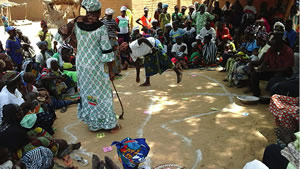
SPRING/Mali is working closely with 26 communities in the Mopti region to end open defecation through the established community-led total sanitation (CLTS) approach. In partnership with the local sanitation authorities, the Direction Regionale de l'Assainissement et du Contrôle des Pollutions et des Nuisances (DRACPN), SPRING mobilized community members using the CLTS approach and social and behavior change communication (SBCC) to generate collective action in achieving open defecation free (ODF) status.
SPRING “triggered” 26 communities in CLTS, a process that includes generating disgust among community members by mapping the defecation areas in the community through “transect walks” and identifying fecal pathways. SPRING staff conducted transect walks and asked villagers about defecation practices as a tool for generating shared disgust and shame that ultimately motivates the community to end open defecation. While latrine use and construction are essential to achieving ODF, the CLTS process focuses more on behavior change and community mobilization to ensure sustainability. In the coming months, SPRING staff will make routine visits to these CLTS communities, monitoring their progress towards achieving ODF, and introducing four crucial water, sanitation and hygiene (WASH) behaviors.
These four behaviors – safely disposing of feces, handwashing, using only boiled or treated water for consumption by children aged 6 – 24 months, and ensuring children have clean play spaces – are integral steps on the path toward improving hygiene, especially during the first 1,000 days. This time period, from pregnancy to a child's second birthday, is an important time in children’s development and growth. Promoting these four WASH behaviors and CLTS in Mali is similar to SPRING's work in Ghana.
In addition to implementing CLTS, SPRING/Mali also promotes the Essential Nutrition & Hygiene Actions (ENA/EHA) through facility and community level trainings. This year, we have trained 375 people in ENA/EHA. To promote critical WASH behaviors, we have collaborated with the regional government to support handwashing with soap through the use of tippy taps, establishing over 1,500 tippy taps at household levels.
SPRING hopes to certify at least 15 villages ODF by February 2016.